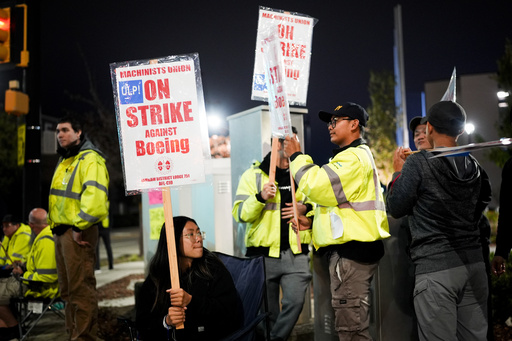Aircraft assembly workers at Boeing factories near Seattle and other locations have initiated a strike after union members voted to reject a proposed contract that included a 25% wage increase over four years. The strike began at 12:01 a.m. PDT following an announcement by the local branch of the International Association of Machinists and Aerospace Workers that a vast majority of workers voted against the contract and for the work stoppage. Approximately 33,000 Boeing machinists, primarily in Washington state, are participating in the strike, which is anticipated to halt production of the company’s popular commercial aircraft. However, it will not impact commercial flights directly.
The striking workers are responsible for assembling Boeing’s 737 Max, 777, and 767 cargo planes at facilities in Renton and Everett, Washington. The strike is not expected to affect the production of Boeing 787 Dreamliners, which are built by nonunion workers in South Carolina. The rejected contract offered wage increases leading to an average of $106,350 annually at the end of the four-year period, up from $75,608 on average. Despite the wage increase, the deal fell short of the union’s initial demand for higher pay raises over a shorter timeframe.
The union also sought to reinstate traditional pensions, which were eliminated ten years ago, but instead settled for increased Boeing contributions to employee 401(k) retirement accounts. Workers expressed discontent with the wage offer, citing inadequate compensation in light of rising living costs. Boeing responded to the strike announcement by expressing readiness to return to negotiations and achieve a new agreement. The strike marks another challenge for Boeing, which has faced numerous setbacks this year, including manufacturing issues and federal investigations.
The strike will impact Boeing’s revenue stream from delivering new planes, posing a challenge for the company in a challenging period. The new CEO, Kelly Ortberg, stressed the importance of avoiding a strike to aid in the company’s recovery. However, the strike proceeded as workers demanded better terms in the contract. A previous strike in 2008 cost Boeing roughly $100 million daily in deferred revenue, highlighting the potential financial impact of the current labor action. Workers like Solomon Hammond emphasize the necessity of securing a better contract aligned with current economic conditions. They are prepared to strike for as long as necessary to achieve improved terms.


